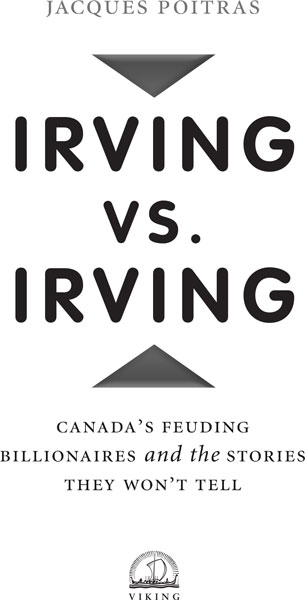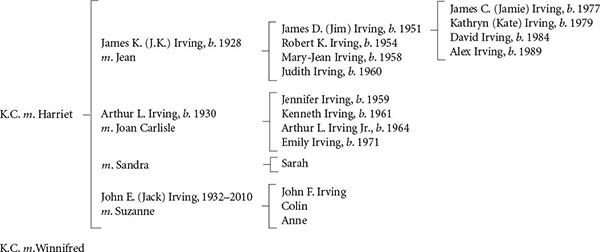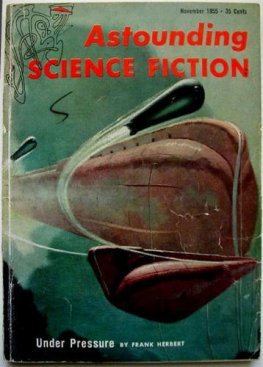IRVING
VS.
IRVING
ALSO BY JACQUES POITRAS
The Right Fight:
Bernard Lord and the Conservative Dilemma
Beaverbrook: A Shattered Legacy
Imaginary Line: Life on an Unfinished Border

FOR ROBERT PICHETTE
A newspaper is of necessity something of a monopoly, and its first duty is to shun the temptations of monopoly. Its primary office is the gathering of news. At the peril of its soul it must see that the supply is not tainted.
C.P. SCOTT, THE GUARDIAN, MANCHESTER, 1921
CONTENTS
FAMILY TREE
KENNETH COLIN (K.C.) IRVING, 18991992

CAST OF CHARACTERS
K.C. IRVING: Son of a small-town businessman and the founder of the Irving group of companies as it is commonly known. Father of J.K., Arthur, and Jack, who took over management of the various companies.
J.K. IRVING: K.C.s eldest son, whose responsibilities include the forestry division, J.D. Irving Ltd., and the shipbuilding business. He is the father of Jim Irving and grandfather of Jamie. In 1971, he became co-owner, with his brother Arthur, of New Brunswick Publishing, publisher of the Telegraph-Journal and the Times-Globe. He is now the sole owner of Brunswick News Inc., which publishes all the Irving dailies and weeklies.
ARTHUR IRVING: K.C.s second son, who ran Irving Oil; he brought his two sons, Kenneth and Arthur Jr., into the company. Arthur co-owned New Brunswick Publishing with J.K.
JACK IRVING: K.C.s third son, who ran a variety of Irving companies including its construction businesses. Jack worked closely with Arthur building Irving gas stations. He owned Fredericton-based University Press of New Brunswick, publisher of the Daily Gleaner; and Moncton Publishing, publisher of the Times and Transcript newspapers (later merged into the Times-Transcript). Jack died in 2010.
JIM IRVING: J.K.s oldest son, and the oldest grandson of K.C., has assumed responsibility for the group of companies run by his father. He is also the president of Brunswick News Inc.
JAMIE IRVING: Jims oldest son, Jamie is the vice-president of Brunswick News, directly responsible for running the company.
KENNETH IRVING: Arthurs oldest son, he took over as CEO of Irving Oil in 2000 and ran the company until his abrupt departure in 2010.
JOHN IRVING: Jacks oldest son, he was the first president of Brunswick News after it was created in 1998. He left the company in 2005 to run Acadia Broadcasting. He took over the real estate and construction companies his father had managed after Jacks death in 2010.
THE NEWSPAPERS
The Telegraph-Journal, known at various times as the New Brunswick Telegraph-Journal and the Saint John Telegraph-Journal, is the flagship Irving newspaper, published in Saint John and distributed throughout New Brunswick.
The Evening Times-Globe, for most of its existence, was the daily afternoon sister paper to the Telegraph-Journal, sharing staff and offices but serving a local Saint John readership.
The Times-Transcript is based in Moncton and primarily serves the southeast part of New Brunswick, though it is distributed in the northeast as well. Until 1983, when they merged, the Times was the morning paper and the Transcript was published in the afternoon.
The Daily Gleaner is the daily newspaper based in Fredericton, New Brunswicks capital.
AUTHORS NOTE
I worked at the Telegraph-Journal from 1993 until 2000, and for the Moncton Times-Transcript for three earlier summers during my university years. This gave me a more nuanced view of the Irving ownership issue than either the rosy perspective of the familys defenders or the robber-baron caricatures of its critics.
In 1997, as the Telegraphs Ottawa correspondent, I covered the ceremony when J.K. Irving was invested into the Order of Canada. Afterward, we chatted briefly. It was the first time I met him, and I thanked him for the newspapers support of me and three colleagues when we were sued for defamation by a disgraced politician. It would have been easy, and tempting, for the newspaper to agree to a cash settlement, but Mr. Irving allowed the newspaper to defend the case in court. We won at trial, and I wanted him to know I was grateful.
Still, I felt the need to avoid giving Mr. Irving special treatment when I filed my story that day. I gave equal play to the days other investee from New Brunswick, Sarah Anala, a Saint John woman who worked as a counsellor to aboriginal offenders. For the sake of transparency, I mentioned in my story that Mr. Irving owned the newspaper I worked for.
All of this is to say that I have written this book neither to praise nor to condemn the Irvings, their newspapers, or their employees. Many of my friends have done excellent work at the papers. Several still do now. There is, however, a broader story of how the worlds of industry, media, and politics influence each other. In New Brunswick, a small province often desperate for private-sector investment, it can be especially difficult to tell that kind of story candidlyeven when it is a very good story, as this one is.
PROLOGUE
BEHAVE YOURSELVES
F red Hazel knew something had changed the moment he saw the front page.
Hazel had stepped outside his modest shingled house on Duchess Street, in Saint Johns west end, to pick up his copy of the Telegraph-Journal sitting on the doorstep. It was the morning of Wednesday, August 18, 1993; Hazel had retired from the newspaper the previous year after more than four decades as a reporter and editor, including twelve years as editor-in-chief. Still a newsman at heart, he unrolled the bundle of pages to see the big news of the day on page one.
In a lifetime spent in the Saint John newsroom, Fred Hazel had seen a lot of front pages, but this headline, the photos, the very subject matter were like nothing he had seen before. I thought it was unusual, he recalls now, with his typical softspoken understatement.
Hazels reaction was shared across Saint Johnin fact, across the entire province of New Brunswick. The word sensational is used too often in the media business, but this story was sensational: rarely had a Telegraph-Journal article provoked such a unanimous reaction. People were really shocked, says one prominent community leader. They were surprised.
The newspaper had obtained the last will of K.C. Irving, the billionaire industrialist whose vast, diverse enterprises made up the single largest private-sector economic force in New Brunswick. His forestry mills kept entire towns alive; his oil refinery accounted for more than half the provinces exports. His power and influence were constant topics of conversation, especially in Saint John, the heart of his empire. Those who admired him and those who feared him agreed on one thing: K.C. Irving, once listed as Canadas richest man, was a singular figure, endlessly fascinating and famously secretive.
Irving had died the previous December, at ninety-three, during a Christmas visit to Saint John. He had made Bermuda his primary residence in 1972 to protect himself from Canadian taxation. Now, the Telegraph-Journal was breaking the news that Irving had left control of his multi-billion-dollar empire not in the hands of his three sons, J.K., Arthur, and Jack, who still ran the various companies from Saint John, but under the ownership of an offshore trust in Bermuda, run by three non-Canadian trustees, including K.C.s widow. His sonsthe Irving boys, as they were still known in their sixtieswere managing the enterprises, but could have no say in running the trust unless they, too, took up residence outside Canada. Irvings Last Will Bequeaths Foreign Exile for His 3 Sons, blared the headline dominating the front page above photos of J.K., Arthur, and Jack. Control of Entire Estate Linked to Non-residency, said a subhead. A small sidebar, placed next to a severe-looking photo of the dead patriarch himself, reproduced the text of the relevant section of the will so readers could peruse it for themselves. Like Father, Like Sons? the headline asked. K.C.s Canada Clause.
Next page










